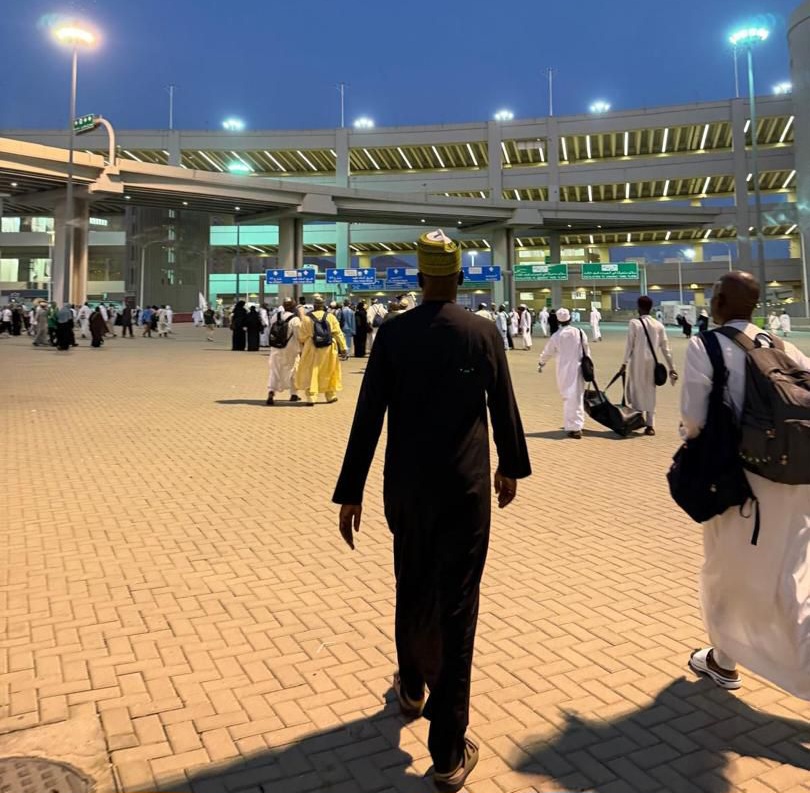● No Retinue, No Fanfare: How his silent Hajj speaks louder than his years at the helm of NNPCL
● A lesson for all in power: Humility begins where the motorcade ends
Mele Kyari was recently sighted in the dusty winds of Mecca; a figure once central to Nigeria’s energy empire was seen walking silently among the millions circling the Kaaba. Here, stripped of title and entourage, Kyari, formerly the Group Chief Executive Officer of the Nigerian National Petroleum Company Limited (NNPCL), brings to life a universal truth: power is but a vapour, a mirage that fades the moment one steps away from it.
It was not long ago that Kyari’s name reverberated through boardrooms and government halls. Appointed in July 2019, he steered Nigeria’s oil juggernaut through seismic reforms, transitioning NNPC into a limited-liability company under the Petroleum Industry Act, culminating nearly six years after his ascension in the dissolution of the board and his own flight from office on April 2, 2025. …CONTINUE READING
Today, there were no official convoys. No aides flanking him. No ceremonial guard. Kyari’s pilgrimage was quiet, private, and leaned only on faith.
In the infernal heat of Mecca, temperatures climb to 42 °C and beyond; pilgrims cling to umbrellas, stoicism, and resolve
Kyari, clad in the unstitched simplicity of the ihram, joined the unending tawaf around the Kaaba, shoulder-to-shoulder with the cosmos of believers. He was no VIP. He was every man: self-accountable, vulnerable, present.
From atop Mount Arafat, with its ancient resonance, he prayed not as the ex-boss of NNPCL, but as a supplicant before the Divine. In that moment, one saw not a man who once commanded a nation’s most strategic corporation, but a soul laid bare by humility.
While in office, Kyari was often accompanied by aides. He moved through airport lounges and oil rigs under watchful eyes, shielded from the world and cloaked by courtesy. His tenure, however, was not without trial: allegations of misappropriation, lavish expenditure on refinery overhauls, and even protests from civil society, as well as uproar within Nigeria and overseas.
As President Bola Tinubu moved to strip him of his mantle, accusing him, implicitly, of failing to optimise crude output, curb theft, and ensure refinery delivery, Kyari’s public life unravelled.
The world slid away. Fans, followers, influence, they all retreated like an ebbing tide.
Hajj, one of the five pillars of Islam, symbolises the unity and equality of man, stripped of pretence, marked only by faith’s weight. In the thrumming swirl around the Kaaba, there is no room for titles. National CEOs, royalty, billionaires, they walk indistinguishable from a shepherd and a baker, the great and the humble swaying as one.
In this melting pot of faith, Kyari, his designation merely a memory, must have felt the weight of these truths: that authority is borrowed, and that all borrowed power is returned.
Ambitious reforms marked Kyari’s NNPCL stewardship. Civil society groups decried the $1.5 billion spent on Port Harcourt refineries and the disappearance of 89 million barrels of crude. In London, Nigerians demanded his deportation, calling his foreign sojourn an insult to accountability. In Abuja, others warned of disinformation and urged measured media reportage.
Yet, the controversy did little to taint his pilgrimage: there he was, stepping aside from the tempest of public life, retreating to reflection.
Kyari’s journey is neither farce nor spectacle. It is a canvas upon which the universal warning is painted in broad strokes.
Kyari’s journey is neither a spectacle nor a tragic theatre of fallen grandeur. Rather, it stands as a solemn canvas, its broad strokes brushed with an ancient truth about the nature of power. Titles, no matter how illustrious, are fragile ornaments. Officialdom, for all its pageantry, is merely a temporary crown resting lightly on the head, ready to be lifted away without warning. When it is gone, what remains is not the emblem but the person, stripped of position, compelled to rebuild a sense of self without the scaffolding of office.
And beyond the loss of status lies the inevitability of accountability. Whether one stands before shareholders, citizens, or the Divine, there comes a moment when reckoning can no longer be deferred. No office lasts long enough to outlive that reckoning. In the final tally, power does not protect—it exposes.
But within that exposure lies a balm, and that balm is humility. Once the titles fall away and the trappings are gone, a man meets himself unfiltered. The polish fades, the insulation dissolves, and what stands before the world is a mortal, no more and no less. On the sacred grounds of Mecca, amid the throngs of pilgrims cloaked in equal white, Kyari delivered a sermon not with words, but with presence. His quiet movements among the faithful became a caution carved in dust: walk softly in power, for it departs as suddenly and silently as it arrives, leaving behind only the truth of who you really are.
From Tawaf’s orbit emerges a profound parable: life, like the Kaaba, is at once centre and mystery. Those who encircle it may feel exalted, but none remain elevated forever. All return to earth eventually, vociferous or humble, celebrated or anonymous.
Mele Kyari’s fall from GCEO to pilgrim compresses this arc: from commanding pipelines and policy to carrying only water and prayer.
This is not a dirge sung over Kyari’s fall from high office. It is not a eulogy for influence lost. Rather, it is a quiet celebration of humility. His journey invites reflection. It presses gently, yet firmly, against the conscience of those who still hold the levers of power.
It asks: while you wield influence, will you remember how delicate it truly is? Will you carry with you the awareness that every decision made—every stroke of the pen, withheld truth, squandered opportunity—echoes not just in chambers of governance, but in the lives of those who can neither speak nor resist?
And ultimately, will you understand that no position, however gilded, can insulate you forever? That stewardship ends, often without fanfare, but what endures, what survives the erosion of titles, is character. Integrity is not inherited with office; it is built, slowly and often painfully, in the quiet choices a leader makes when no one is watching.
When the banners are taken down, when the salutes cease, and the news cycles move on, what will remain is the residue of how one led. That is the lasting monument. Not the office held, but the soul revealed.




